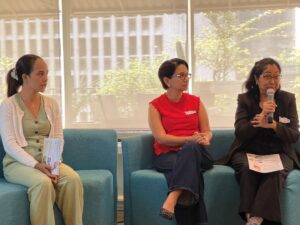Group pushes more ‘child life services’ in PHL hospitals
Kythe Foundation, Inc., said on Monday that many hospitals in the Philippines lack “child life services” essential to the overall well-being of sick children. “The levels of anxiety in these children significantly decreased upon the provision of the child life services,” Kythe Foundation Consultant Angie Sievert-Fernandez told reporters in a roundtable discussion. “It really needs […]

Kythe Foundation, Inc., said on Monday that many hospitals in the Philippines lack “child life services” essential to the overall well-being of sick children.
“The levels of anxiety in these children significantly decreased upon the provision of the child life services,” Kythe Foundation Consultant Angie Sievert-Fernandez told reporters in a roundtable discussion.
“It really needs to be pushed because it should already be rolled out, but why is it not being done up to this date?” she added.
Child life services are a psychosocial support to parents and pediatric patients in hospitals to help cope with the stress and anxiety of medical treatments and healthcare settings.
“It’s not just the child, sometimes, it also includes the siblings; it’s the entire family,” Maria Fatima “Girlie” Garcia-Lorenzo, president and co-founder of the group, said at the same event.
“We also have a behavioral program to support those parents who are losing their kids,” she added.
The said service also aims to minimize the psychological trauma of kids from medical procedures through counselling, therapeutic play, and age-appropriate explanations of treatments they need to undergo.
“Let them understand their illness. Let them understand the procedures. Why all the pricks and pokes? What do we do? Why do we have that?” Ms. Fernandez said. “You have to let them understand that because the children they think differently.”
“When a child knows what is being done and why, then it lowers anxiety and heightens compliance,” she added.
Under the National Integrated Cancer Control Act or Republic Act 11215, section seven, all appropriate hospitals and facilities must have provisions for child life services.
Data from Ms. Fernandez found that there are about 60 hospitals nationwide with pediatric cancer patients, but only 11 hospitals offer the said support to chronically ill children.
Among the hospitals with child life services, nine are affiliated with the foundation.
According to the Philippine Council for Health Research and Development (DOST-PCHRD), at least 5,000 Filipino children are diagnosed with cancer annually.
“Imagine all the other chronic illnesses out there…We are talking about millions of children in the country who are needing treatment but beyond that, they need healing,” Ms. Fernandez said.
“And healing doesn’t come only in medicine. Healing also comes in the support that you have from psychosocial support,” she added.
Ms. Lorenzo said that offering plantilla positions for child life coordinators and the lack of designated play areas in hospitals hinder the implementation of the service.
“What’s difficult is they just give us a person and they do it part-time so the program will not fly; it’s part-time,” she said.
“Another problem is the play area,” she added. “When you approach one hospital, the medical director asks us right away, what’s the ROI (return of investment) if we give you that space.”
Ms. Fernandez noted that hospitals often overlook the economic benefits of having a child life service in their institutions.
“For children who needed to [undergo] MRI, and they were prepared and educated instead of getting the full sedation, they receive partial sedation, or no sedation,” she said. “So, that’s savings for the hospital.”
As of 2025, Kythe Foundation has supported over 20,000 children nationwide since 1992.
“Imagine all of these children of ours in the Philippines who have mental health issues and trauma related to this and they are not supported,” Ms. Fernandez said.
“[They] will be the adults in the future. What is the impact of trauma? What is the impact of anxiety or fears? What kind of adults would we have,” she added. “So, it’s actually not just for now, it’s also for the future.” — Almira Louise S. Martinez










